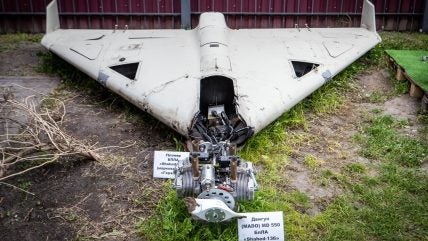
The US Department of the Treasury’s Office of Foreign Assets Control (OFAC) has announced a sweeping new round of sanctions aimed at crippling Iran’s unmanned aerial vehicle (UAV) production capabilities.
This latest action targets four entities associated with the already-designated Rayan Roshd Afzar Company (RRA) and an executive of the Iran Aviation Industries Organization (IAIO), a subsidiary of Iran’s Ministry of Defense and Armed Forces Logistics (MODAFL).
These measures are part of a broader strategy to thwart Iran’s supply of UAVs to Russia for use in Ukraine and to regional terrorist proxies.
Impact on Iran’s UAV supply to Russia and proxies
Iran is currently supplying Russia with weapons, including loitering munitions, which are being used in Ukraine, as per GlobalData’s intelligence on the US defence market. Russia has widely employed the Iranian-designed Shahed loitering munition, which costs $20,000 per unit, to target Ukrainian civil infrastructure.
Under Secretary of the Treasury for Terrorism and Financial Intelligence, Brian E. Nelson, emphasised that these sanctions are designed to disrupt Iran’s production, “Today’s action reinforces our commitment to disrupt Iran’s production and proliferation of deadly UAVs that continue to be used by Russia against Ukraine and by regional terrorist proxies against our troops”.
Nelson reaffirmed the Treasury’s commitment to imposing costs on those facilitating Iran’s UAV programmes, “Treasury will continue to impose costs on those who seek to procure the components Iran needs for its UAV programs and enable the shipment of these weapons to destabilising actors around the world.”
Background and previous sanctions
The sanctions fall under Executive Order 13382, targeting weapons of mass destruction proliferators and their delivery mechanisms. This move builds on several previous actions by OFAC in 2024, which focused on third-country procurement networks and key executives supporting Iran’s UAV and missile production.
The United States has previously imposed sanctions on networks spanning Iran, Malaysia, Hong Kong, and Indonesia, aiming to disrupt Iran’s UAV production. The US Treasury has also sanctioned a prominent procurement network facilitating Iran’s ballistic missile and UAV programmes, with entities in Iran and Hong Kong involved.
RRA, along with its affiliates, has been under US scrutiny since 2017 for its role in producing components for the Islamic Revolutionary Guard Corps’ UAV programme. The newly sanctioned entities include Rayan Fan Kav Andish Co, Kish Mechatronics Co, Fanavarihaye Hava Pishran Sazeh Sepehr Co LLC, and Mersad Mohajer Co LLC, all implicated in evading sanctions and procuring critical parts for Iran’s defence industries.
Furthermore, the Treasury has designated Afshin Khajeh Fard, chief of IAIO, highlighting his role in advancing Iran’s UAV and missile production. IAIO oversees manufacturers such as Iran Aircraft Manufacturing Industrial Company (HESA) and Qods Aviation Industries, which produce various UAV models used in regional conflicts.
As a result of these sanctions, all US-based assets of the designated entities and individuals are frozen, and US persons are prohibited from engaging in transactions with them. The action aims to isolate these entities from the global financial system and impede their operations.
OFAC’s sanctions, while punitive, also offer a path to compliance, emphasising the potential for removal from the sanctions list if behaviour changes positively. This dual approach shows the US strategy of using economic pressure to drive change while maintaining the integrity of international law.
In February of 2024, A US Coast Guard cutter deployed to CENTCOM seized a shipment of Iranian weapons intended for Houthi-controlled areas in Yemen on January 28, 2024. The intercepted weapons included medium-range ballistic missile components, explosives, unmanned underwater/surface vehicle components, military-grade communication equipment, and anti-tank missile launcher assemblies.




